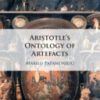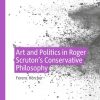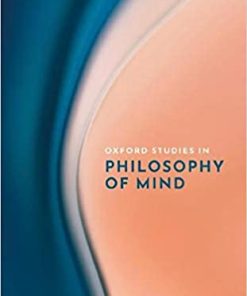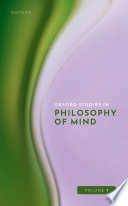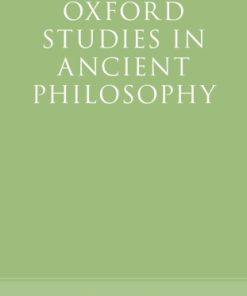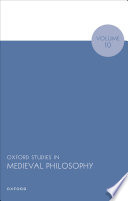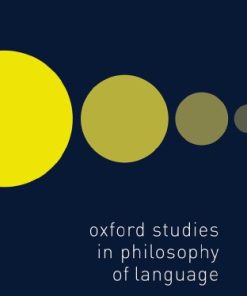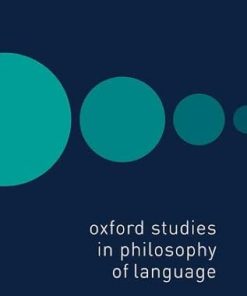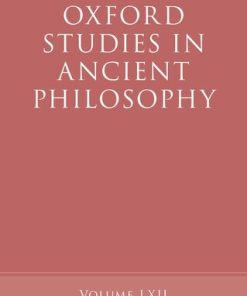Oxford Studies in Medieval Philosophy Volume 9 Robert Pasnau 9780192659026 0192659022
$50.00 Original price was: $50.00.$25.00Current price is: $25.00.
Oxford Studies in Medieval Philosophy Volume 9 Robert Pasnau – Ebook Instant Download/Delivery ISBN(s): 9780192844637,0192844636,978019265902,0192659022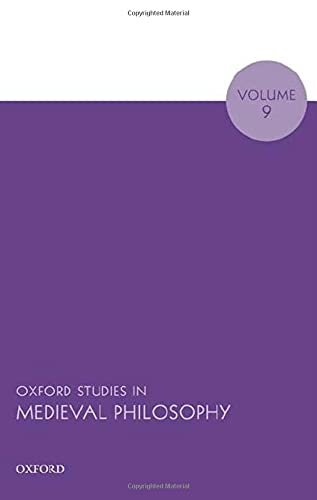
Product details:
- ISBN 10: 0192659022
- ISBN 13: 9780192659026
- Author: Robert Pasnau
Oxford Studies in Medieval Philosophy showcases the best scholarly research in this flourishing field. The series covers all aspects of medieval philosophy, including the Latin, Arabic, and Hebrew traditions, and runs from the end of antiquity into the Renaissance. It publishes new work by leading scholars in the field, and combines historical scholarship with philosophical acuteness. The papers will address a wide range of topics, from political philosophy to ethics, and logic to metaphysics. OSMP is an essential resource for anyone working in the area.
Table contents:
Part I. Perception and Extramission in De quantitate animae
1. Augustine and Extramission
2. The Textual Evidence
3. Dialectical Context
4. The Definition
5. Augustine’s Counterargument
6. The Grades of Extramissive Involvement
7. Extramission in the Augustinian Corpus
8. Conclusion
Part II. Believing Miracles in 10th–11th Century Baghdad: Four Christian Philosophers on a Problem of Epistemic Justification
1. Introduction
2. Yaḥyā b. ʿAdī (d. 974): Miracles and Epistemic Agency
3. Ibn Zurʿa (d. 1008): Towards a Rational Assessment of Miracles
4. Ibn al-Samḥ (d. 1027): Granting Belief to Reports of Miracles
5. Ibn al-Ṭayyib (d. 1043): Doing without Miracles
6. Conclusion: Christian Philosophers in the Light of Islamic Theology
Part III. Now Is Not the Time: Revisiting Avicenna’s Account of the Now
1. Aristotle and His Commentators on the Now and Its Relation to Time
2. The Now in Avicenna’s Philosophy of Time
3. The Now as wāṣil and fāṣil
4. Is There a Flowing Now Producing Time?
5. Is There a Flowing Now Producing Time in The Lecture on Nature II.12?
6. Conclusion
Part IV. Thirteenth-Century Aristotelian Logic: The Study of Scientific Method
1. Preliminaries
2. The 1230s, Nicholas of Paris
3. The 1250s, Albert the Great
4. 1290s, Radulphus Brito
5. Conclusion
Part V. Bonaventure, Aristotle, and the Being of Universal Forms
1. The Current Consensus: Bonaventure’s Forms and his Attitude towards Aristotle
2. Forms: Universal or Individual?
3. The Relationship between Seminal Reasons and Universal Forms
4. Conclusion
Part VI. On Loving God Contrary to a Divine Command: Demystifying Ockham’s Quodlibet III.14
1. Introduction
2. Five Claims of Quodlibet III.14
3. On the Contingency of Moral Status and the Goodness in Loving God
4. On the Command to Not Love God
5. On Obeying the Command to Not Love God
6. Conclusion
Part VII. Productive Thoughts: Suárez on Exemplar Causes
1. Introduction: Two Problems
2. The Critique of Objective Existence Theories
3. The Act Theory
4. Acts and Their Causal Function
5. Conclusion
People also search:
oxford university philosophy syllabus
oxford philosophy requirements
oxford studies in philosophy of religion
oxford studies in ancient philosophy
oxford studies in early modern philosophy
You may also like…
Politics & Philosophy - Major Branches of Philosophical Study
Oxford Studies in Philosophy of Mind, Volume 1 Uriah Kriegel
Politics & Philosophy - Renaissance & Modern Philosophy
Politics & Philosophy - Anthropology
Oxford Studies in Ancient Philosophy, Volume LVI 1st Edition
Uncategorized
dictionaries & phrasebooks
Uncategorized
Politics & Philosophy - Ancient & Medieval Philosophy
Oxford Studies in Ancient Philosophy, Volume 62 Victor Caston (Editor)


